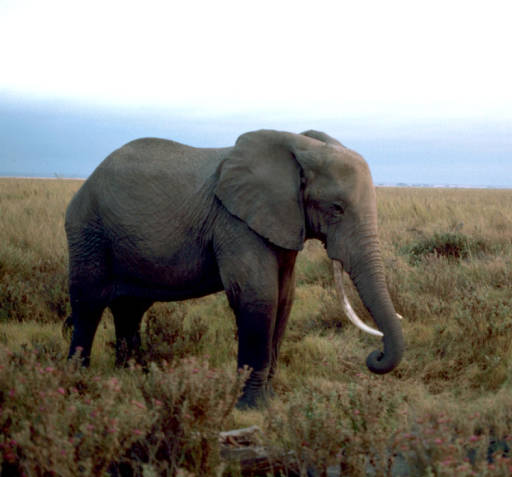
Do elephants have the power to vote?
It seems like they do, because just days after the U.S. Fish and Wildlife Service announced it would lift a ban on importing elephant body parts claimed during sport hunts in Zimbabwe and Zambia President Trump tweeted that he would “put big game trophy decision on hold until such time as I review all conservation facts.”
The issue at hand is what’s known as big game trophy hunting. Many Americans pay large fees—$50,000 or more—to hunt storied savannah animals like lions and elephants in African parks and reserves. Supporters of these hunts say that they are done legally and with local guides and bring much-needed income into poor areas that is then used toward conservation efforts and the prevention of illegal poaching. The hunters would like to bring back to America body parts from the animals they kill to display in their homes, but the Obama Administration banned the import of such trophies in 2014.
Critics of big game hunts, and the importation of trophies that follows, say the practice helps create a market for animal body parts, which encourages illegal poaching, and is downright cruel, as many of these animals, such as elephants, are complex creatures with dynamic social systems and should never be hunted for sport. Critics also dispute just how much money big game trophy hunts pull in for conservation. According to the Washington Post, Richard Leakey, a Stony Brook University anthropologist who chairs the board of the Kenya Wildlife Service said “the amount of money generated by a handful of trophy hunters pales in comparison with what wildlife-viewing tourism generates.”
Astonishingly, when the repeal of the Obama-era ban surfaced in the news last week, it became the rare issue that tied the highly divided Left and Right sides of the American political spectrum together. “DO BRAVE MEN HUNT ELEPHANTS?” tweeted conservative radio host Michael Savage. The conservative Fox News host Laura Ingraham and Republican Edward R. Royce, Chairman of the House Foreign Affairs Committee also stepped in against the decision. As did Wayne Pacelle, President of The Humane Society, who made the following statement to the Christian Science Monitor: “What kind of message does it send to say to the world that poor Africans who are struggling to survive cannot kill elephants in order to use or sell their parts to make a living, but that it’s just fine for rich Americans to slay the beasts for their tusks to keep as trophies?”
Clearly, elephants are an issue that can cut across America’s political divide, but why? On the surface, the answer seems obvious. Elephants, unlike say jellyfish or slime mold, are human-like, and the more human-like a species is, the more humans will be inclined to want to protect that species (Scientists recognize three distinct species of elephant, the African bush elephant, the African forest elephant, and the Asian elephant). But what traits connote the quality human-like?
Monkeys look like us and represent near biologic cousins, yet still, according to People for the Ethical Treatment of Animals (PETA), “Every year in the U.S., more than 105,000 primates are imprisoned in laboratories, where they are abused and killed in invasive, painful, and terrifying experiments.” And cows care for their young in a way that is stirringly human, yet are still grown on farms, run through diabolical slaughterhouses, and churned by the tens of millions into hamburgers each year. Elephants until very recently were widely used as props in circuses, but even that trend appears to have abated. In 2015 Ringling Brothers and Barnum & Bailey announced that its three touring circuses, performing 1,000 shows a year, would phase out elephant acts by 2018.
When it comes to charismatic species dearest to the hearts of humans, elephants have risen as high as chimpanzees and dolphins, if not higher. So, what exactly is it about the elephant?
They have a “highly complex neocortex” and brains that exhibit “a gyral pattern more complex and with more numerous convolutions, or brain folds, than that of humans, primates, or carnivores,” according to a Wikipedia entry on Elephant Cognition. They have a “highly convoluted hippocampus,” are good at problem-solving, and appear to suffer from psychological flashbacks, the equivalent of post-traumatic stress disorder. Elephants also have a remarkable way of using tools to problem-solve. They have been observed digging holes to drink water, then filling the holes with wads of chewed up bark to prevent evaporation and keep their water source safe. Elephants in India have been observed dropping large rocks on electric fences in order to cut off the electricity and ruin them.
Elephants are also considered to be highly altruistic animals. There is a story from India about a work elephant being used to place logs in pre-dug holes at a construction site. At one hole the elephant stopped and repeatedly refused to lower in the log—turns out there was a dog sleeping there. A story from a ranch in Kenya describes a herder who was charged by a mother elephant and suffered a broken leg. A search party later found the man being guarded by an elephant. The victim described being pulled to safety by an elephant that used its trunk to lift him toward the shade of a tree. Such altruistic actions are reminiscent of the beloved American TV dog, Lassie. Or the stories that have surfaced in recent years of dolphins rescuing drowning swimmers. Is this somewhat self-serving rationale the reason why we love elephants, because of their ability to recognize when humans are in mortal danger and step in and save us? Or is there something else?
My own opinion is that our respect and love for elephants stems from their tendency to form close-knit family groups that exhibit deep care for one another throughout their lives, and even unto their deaths. A story conferred by American conservationist Cynthia Moss, who directs the Amboseli Elephant Research Project in Kenya, goes as follows:
Two members of the family were shot by poachers. Although one of the elephants died, the other, named Tina, remained standing, but with knees beginning to give way. Two family members, Trista and Teresia (Tina’s mother), walked to both sides of Tina and leaned in to hold her up. Eventually, Tina grew so weak, she fell to the ground and died. However, Trista and Teresia did not give up but continually tried to lift her. They managed to get Tina into a sitting position, but her body was lifeless and fell to the ground again. As the other elephant family members became more intensely involved in the aid, they tried to put grass into Tina’s mouth. Teresia then put her tusks beneath Tina’s head and front quarters and proceeded to lift her. As she did so, her right tusk broke completely off, right up to the lip and nerve cavity. The elephants gave up trying to lift Tina but did not leave her; instead, they began to bury her in a shallow grave and throw leaves over her body. They stood over Tina for the night and then began to leave in the morning. The last to leave was Teresia.
It is elephant’s concern for their own dead, I would argue, that is their most human emotion of all. And in recent years, perhaps as the study of elephants has flourished, more and more elephant death ritual behaviors have been observed. The animals show a keen interest in bones, and will gently investigate them with their trunks. They have been recorded visiting grave sites. And in some instances, when humans have removed elephant remains, elephants have dragged the parts back to the death site. It has been argued that elephants exhibit the ability to mourn and grieve, as the animals have been observed quietly standing vigil over a dead body for as long as two days.
These observations are significant, as is our reaction to them. And while elephants display many impressive human-like qualities, their ability to care for the dead may be the most touching of all, and the most human. Perhaps it is in their death rituals, that we most deeply connect with elephants—a connection so deep that it can even cut across political divides!
Interestingly enough, amidst the hullabaloo over last week’s trophy hunting decision, there occurred an equally moving elephant case—though one moving in a very different direction.
Science writer Virginia Morell reported in the Atlantic about animal-rights attorney Steven Wise, who last Monday filed a writ of habeas corpus on behalf of three privately owned Asian elephants, arguing that the animals are “legal persons” who have a right to bodily liberty and should be free to live in a sanctuary.
“Taken together, the research makes it clear elephants are autonomous beings,” said Wise, “who have the capacity to choose how to live their lives as elephants.”
Maybe elephant voting won’t be so far off after all.









